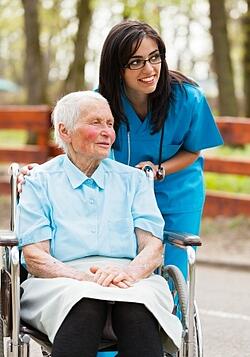
Alzheimer's disease isn’t easily recognized at first.
Its symptoms are usually subtle. An older person may exhibit small changes in personality or find it hard to recall a treasured memory. Day by day, a person with this brain disorder will become more forgetful, will have difficulty organizing his or her thoughts and will have trouble performing routine tasks, such as tying shoes or shopping for groceries.
Caring for a loved one with Alzheimer's is a daunting, time-intensive task. Luckily, no one needs to bear this burden alone. It is important, if someone you care for has been diagnosed with Alzheimer's disease, to seek out memory support services or other brain and mental wellness resources.
What causes Alzheimer's disease?
The truth is that medical science isn’t sure.
What are certain are its effects on the physical structure of the brain. A person with Alzheimer's disease develops numerous small masses, called amyloid plaques, and tangles in the neurological fiber of the brain. Over time, damage caused by these abnormal growths causes neurons—the electrical pathways of the brain—to become disconnected or misrouted. Eventually, this damage leads to shrinkage of the overall amount of brain tissue (a process called atrophy).
The cumulative effect on cognitive functions and personality are catastrophic.
Alzheimer's doesn't affect every person the same way.
The speed with which Alzheimer's progresses is different for every individual, though the end result is always the same, and some people may live years with only mild symptoms.
The disease typically progresses through three stages:
- Mild stage Alzheimer’s is characterized by difficulty with memory and higher cognitive functions. A person at this stage may have trouble adding and subtracting, remembering what he or she had for breakfast, or even forget close relatives' names.
- Persons with moderate stage Alzheimer's often cannot follow simple instructions that they are given. Memory difficulties are keenly obvious, even to those who are unfamiliar with the sufferer. A person at this stage of the disease may need close monitoring, as wandering is common. He or she may experience bowel and / or bladder incontinence, and personal hygiene may suffer.
- Advanced, or end-stage Alzheimer's patients are unable to care for themselves at all. They are typically bedridden or able to move only with help. Most are unable to feed, bathe or clothe themselves and they may become unresponsive to other people. At this stage, the disease is terminal, and the only measures taken are designed to make the patient more comfortable.
There may be no known cure, but there are ways to slow the progression of Alzheimer's disease.
There are many methods for treating Alzheimer's disease. Memory support services, such as cognitive therapy, are designed to engage the patient's brain and “exercise” it. It is thought that regular stimulation of the brain might lead to longer periods of lucidity.
Music and visual recognition therapies have been widely reported as being particularly beneficial as music, color and memory are all processed in the same region of the brain— the temporal lobe.
In music therapy, daily reminders are often set into songs that a patient learns, or music is played in a quiet setting while a patient speaks with a loved one. The hope is that strong stimulation of the temporal lobe via music will help the patient to encode memories more strongly and enable them to recall with less difficulty.
Visual therapies work much the same way—daily tasks or instructions are presented with different, associated colors. This color-coding is designed to help the patient to make a stronger memory and hold it.
Regular social interaction is also invaluable in staving off the advancement of Alzheimer's. Talking, laughing and spending time with friends and relatives can actually help prolong your loved one's memory. Adult day programs are an excellent way to give your loved one supervised social time out of the house, and allow you or a caregiver to take a much needed break.
Consider skilled nursing care or memory support assisted living early on.
Though in-home care and adult day programs are beneficial for many patients with early stage Alzheimer's, needs can change quickly. Talking with your loved one before he or she is unable to make decisions may help you to avoid making heartbreaking, difficult choices down the road.
Early placement in assisted living that offers skilled nursing care and memory support services during later stages may be more beneficial to your loved one in the long run, where they find access to full-time care and supportive peers from the start should a sudden decline occur.
Caregivers need support, too!
Don't forget to take care of yourself. Consider joining a caregivers' support group. Reach out to Alzheimer's advocacy organizations like the Alzheimer’s Association or the Alzheimer’s Foundation of America for help in finding a support group, or for assistance in researching your loved one's illness.
Image credit: lighthunter / 123RF Stock Photo













